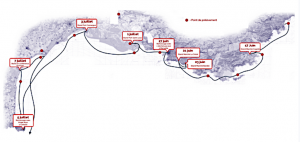Mercator Ocean international supports Sea Plastics for the 2nd year in a row. This NGO, created in AgroPariTech whose crew is composed by 4 students, aims to study plastic pollution in the Mediterranean Sea. Due to disruptions caused by COVID 19, they decided to postpone their expedition departure and to change their mission to analyse the impact of the pandemic on microplastic distribution in the Mediterranean Sea.
An NGO aiming at improving scientific knowledge on Mediterranean plastic pollution
Sea Plastics is an NGO created by university students in 2016. They aim to improve scientific and oceanographic knowledge of plastic pollution in the Mediterranean Sea. The Mediterranean Sea is one of the most contaminated seas in the world, thus it became the focus of their work. They decided to renovate a boat and gather various scientific devices to do onboard water analysis. They are now equipped with a manta trawl to sample the sea surface and a closing net to sample the water columns.
The 2020 expedition supported by Mercator Ocean international
The 2020 expedition has been disrupted due to COVID-19. Their departure was planned in March 2020 but was delayed to May 7th 2020 from Les Ambiers in France. They work closely with two scientists from the University of Barcelona, Ana Sanchez Vidal (professor at UB) and Aitor Fernández Garcia (student researcher). Their collected samples will provide in situ data for their research on the “effect of the degree of anthropization, river discharge, and oceanographic dynamics on concentrations of floating microplastics in the western Mediterranean ”.
Given the pandemic-specific situation, they decided to focus their research on the effects of the quarantine on microplastic dispersion in the Mediterranean Sea. Three trips along the French Mediterranean coast will assess the effects of the confinement and the resumption of activities in the summer. The data will be supplemented with statements from previous years, as well as those from the 2021 expedition. They surveyed 12 different areas using their manta net. They faced a major challenge: taking samples in the Rhône River, a major source of plastic pollution. They collected two sets of samples for their survey. The first was at Port Saint-Louis du Rhône and the second was at the city of Arles.
To lead their expedition, Sea Plastics was supported by Mercator Ocean expertise, along with Copernicus Marine data. For the services provided, they mainly used the Copernicus Marine Service Mediterranean Physics Analysis and forecast product and the Mediterranean Sea Biogeochemistry Analysis and Forecast product.
Raising awareness around the Mediterranean Sea
Each year, during their expedition, the Sea Plastics students stop in ports to deliver awareness sessions in schools. However, due to COVID-19 these activities are not possible. Thus, they adopted new methods and found new places to raise awareness amongst citizen. For example, they created stands in food markets and organized waste collection in collaboration with others associations.

